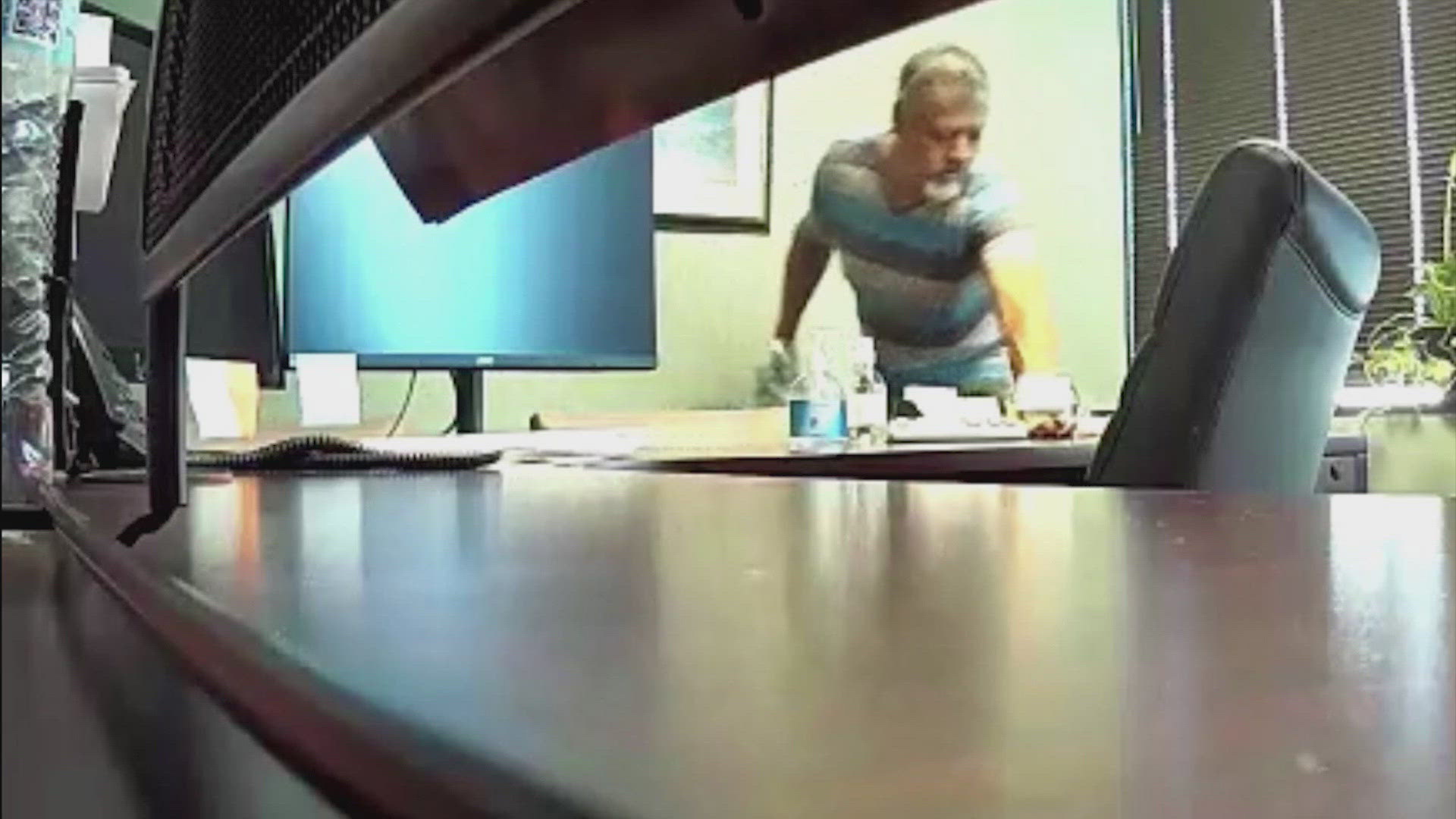Lucio Catarino Diaz: Janitor's Crimes & Prison Sentence - [Updates]
Can you imagine a scenario where a seemingly mundane act of cleaning takes a sinister turn, leaving a trail of physical and emotional scars? In a shocking case that has sent ripples of disbelief and disgust through the Houston community, a janitor, Lucio Catarino Diaz, has been sentenced to six years in prison for a series of heinous acts that involved contaminating water bottles with bodily fluids, specifically targeting the women in a Houston medical office.
The details of this case, which unfolded over a period of time, paint a grim picture of betrayal and violation. Diaz, who worked as a janitor at a Houston doctor's office, was caught in the act of contaminating water bottles, allegedly spreading sexually transmitted diseases (STDs) among the office staff. The victims, unsuspecting and vulnerable, were exposed to the potential for serious health consequences, including herpes and hepatitis. The insidious nature of the crime, carried out under the cloak of routine cleaning duties, has sparked outrage and prompted a broader conversation about workplace safety and the vulnerability of individuals to such predatory behavior.
The gravity of the situation has been reflected in the legal proceedings, with Diaz facing multiple charges, including aggravated assault with a deadly weapon. The "deadly weapon" in this instance, prosecutors argued, was Diaz's own bodily fluids. The case culminated in a guilty plea on Tuesday, with the sentencing reflecting the severity of his actions and the damage inflicted on the victims. The legal process, while seeking to deliver justice, has also highlighted the long-lasting impact of such crimes and the complexities involved in navigating the emotional and physical aftermath.
| Lucio Catarino Diaz - Biography and Professional Information | |
|---|---|
| Full Name: | Lucio Catarino Diaz |
| Age (at time of sentencing): | 53 |
| Occupation: | Former Janitor |
| Location of Crime: | Houston, Texas, USA |
| Crime: | Aggravated Assault with a Deadly Weapon (bodily fluids, including urine, contaminated with STDs) |
| Date of Arrest: | October 2022 |
| Date of Sentencing: | Tuesday, March 18th (reported) |
| Sentence: | Six years in state prison |
| Time Served: | More than two years prior to sentencing, credit for time served. |
| Parole Eligibility: | Eligible for parole after serving three years. |
| Victims: | Multiple women (at least 13) |
| Known STDs Spread: | Herpes, Hepatitis (reported), and potentially other STDs |
| Reference Link: | Click2Houston (Example, verify for current information) |
The investigation into Diaz's actions began in October 2022, when a victim, suspicious of the taste of her water, set up a hidden camera at her desk. The footage captured Diaz approaching the desk at night, setting down his cleaning supplies, and then allegedly committing the acts that would lead to his downfall. This initial evidence, along with subsequent laboratory tests, provided the evidence needed to build a case against Diaz. The use of a spy camera highlights the lengths to which individuals may go to uncover the truth and protect themselves from unseen threats.
The legal proceedings unfolded over several months, with Diaz initially facing multiple counts of aggravated assault. However, in a deal with prosecutors, he ultimately pleaded guilty to a single count of aggravated assault with a deadly weapon. This plea bargain resulted in the dismissal of the additional counts, but the six-year prison sentence reflects the severity of the charges and the impact on the victims. It's a reminder of the complexities within the legal system, where negotiation and compromise play a significant role, but also must balance the desire for justice with the practicalities of the case.
The case has also brought to light the long-lasting effects of such crimes. The women targeted by Diaz are not only dealing with the immediate health risks, such as the spread of STDs, but also the emotional trauma that comes with such a violation of trust. The lawsuit filed on behalf of the victims highlights the desire for accountability and compensation for the damages suffered. The victims' stories are a stark reminder of the ripple effects of such crimes and the importance of providing support and resources to help survivors navigate the healing process.
The use of bodily fluids as a weapon, particularly the intentional contamination of water bottles, is a disturbing aspect of this case. It represents a fundamental breach of trust and a disregard for the safety and well-being of others. The fact that Diaz allegedly used his urine to spread STDs adds another layer of depravity to the situation. The intentional nature of his actions demonstrates a calculated disregard for the potential harm to others. The case is a stark reminder of the potential for evil in the workplace and the need for heightened security measures and vigilance.
The sentencing of Diaz to six years in prison, while a significant punishment, is still a complex issue. While it provides a measure of justice for the victims and society at large, it also raises questions about the appropriate punishment for such crimes and whether the sentence adequately reflects the severity of the offense and the long-term impact on the victims. It's also worth considering the role of rehabilitation and the potential for Diaz to become a productive member of society after his release.
The fact that Diaz will be eligible for parole after serving three years highlights a key aspect of the American justice system. It balances punishment with the possibility of rehabilitation. This aspect of the case brings forward the discussion about the concept of justice. In a situation like this, justice may be considered, not just as a verdict or a sentence but as a process of healing and rebuilding trust. It encompasses not only the punishment of the offender but also the provision of support and resources for the victims to recover from the trauma they have endured.
The case has also highlighted the importance of awareness. The victims, upon noticing something amiss with the taste of their water, were right to investigate. Their vigilance, ultimately, led to the exposure of Diaz's actions and the start of the legal process. This emphasizes that in workplaces, everyone should be aware of the possible risks and be vigilant in order to maintain a safe environment. The use of spy cameras in this instance underscores how technology can both assist in exposing crimes and protecting vulnerable individuals from harm.
The fact that Diaz admitted to tampering with water bottles and infecting several victims with herpes and hepatitis further emphasizes the gravity of his crimes. The admission of guilt is a significant legal step, leading to the finalization of the legal proceedings. But more importantly, it's a pivotal moment, reflecting an acknowledgment of the harm done and a potential step toward accepting responsibility. It also helps to ensure that victims have the option to take appropriate action, which may include the pursuit of civil remedies.
The crime itself is far from being an isolated occurrence. It is an act of serious malicious intent, an act of intentional harm. The case has brought up many questions in regards to the kind of environment the women had to work in. Was the office a place where the women could freely work without thinking that something can go terribly wrong. The answers to this question are not easy to come by, but this case can provide a clear insight into how society should operate. In order to prevent this from happening again, every place of work must ensure that measures are in place, to offer protection and provide a secure place for workers. It's a reminder of the importance of a secure, ethical, and respectful workplace environment.
Chris Spargo, who joined the crime team at People, is one of the reporters who has worked on this case. His role is to present all the facts, to present to the public what happened and to also try to uncover all the hidden details. As a senior reporter, his role helps ensure that the details are available to all of the public.
In the aftermath of the sentencing, the focus must now shift to supporting the victims and ensuring that such a crime never happens again. This includes providing resources and support for the survivors and establishing preventive measures in workplaces. The case of Lucio Catarino Diaz is a reminder of the vulnerability that exists within our society and the crucial need for vigilance, accountability, and justice.



